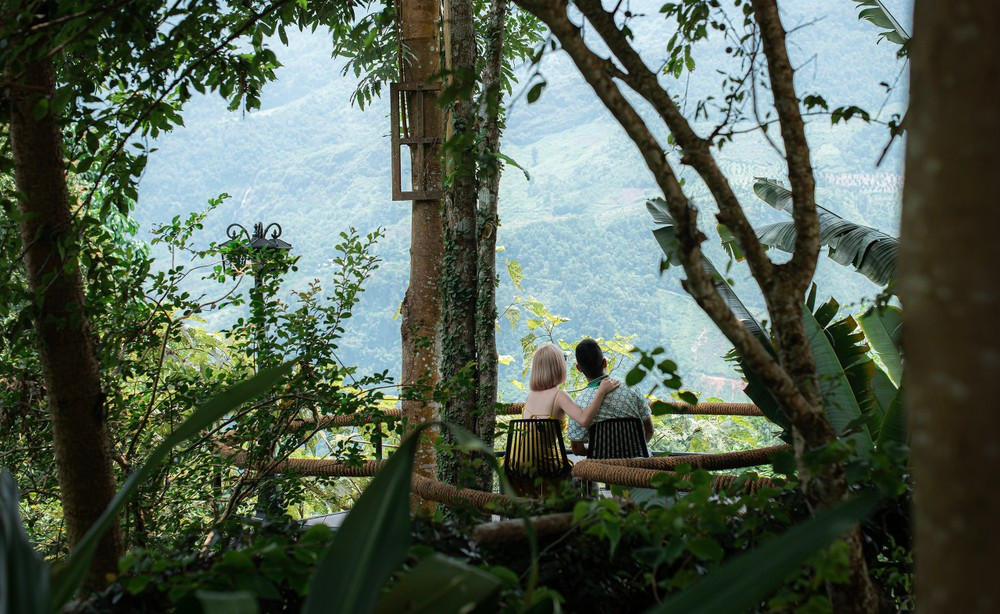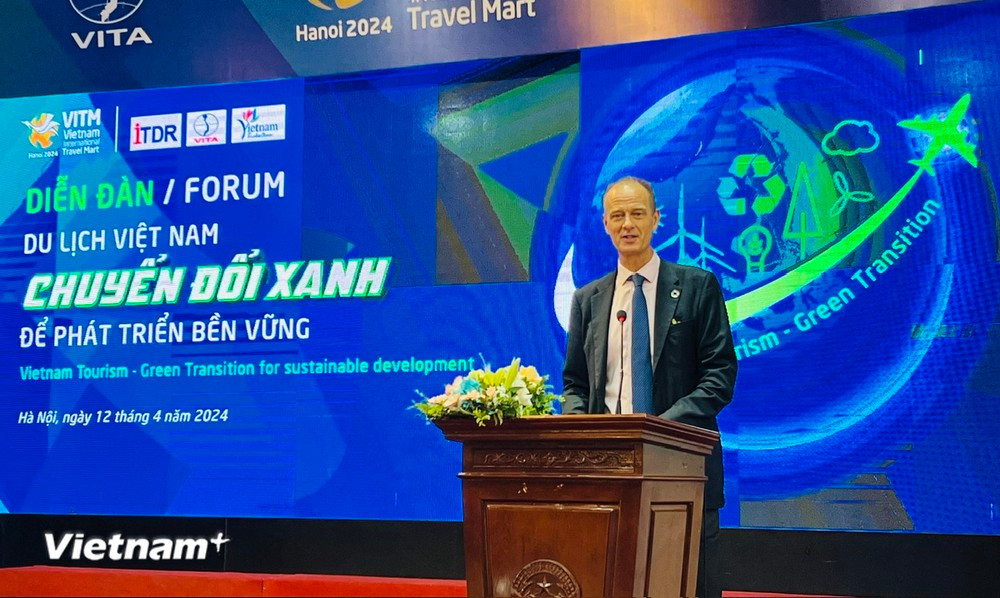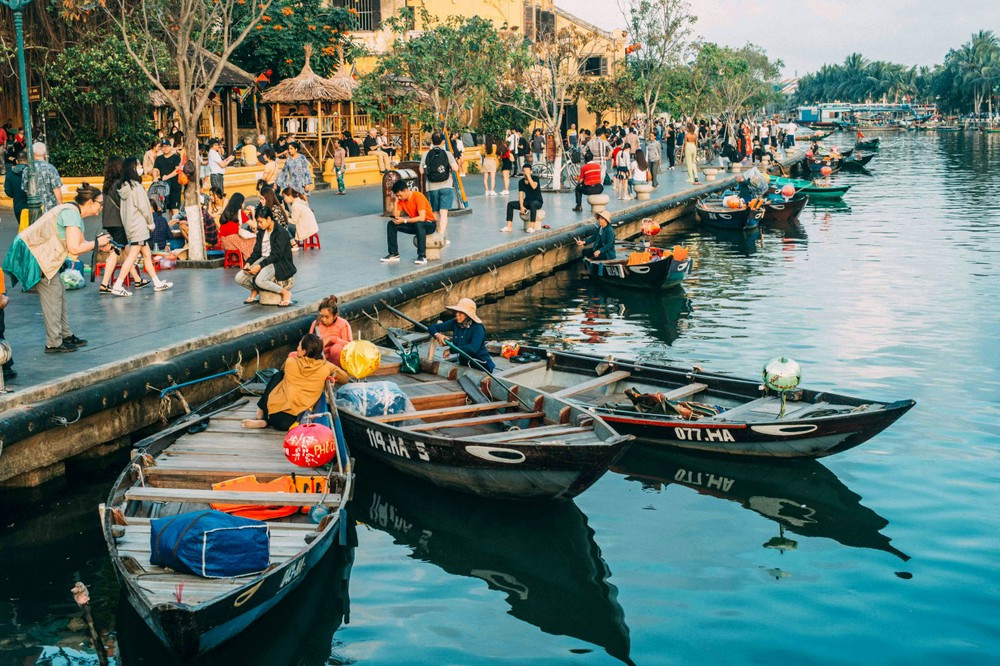For tourism to develop and be sustainable in the future, the green transformation trend is considered an effective and urgent solution in the near future. This is also an inevitable trend of world tourism.

Reality requires the world to join hands to respond to climate change and protect the earth. Within that “orbit”, the Vietnamese tourism industry is having to gradually transform to green, focusing on building a tourism model that uses natural resources reasonably, in order to limit negative impacts on the living environment.
That is also the reason why the “Vietnam Tourism Forum - Green Transformation for Sustainable Development” was held this morning, April 12, in Hanoi. The event is within the framework of the Vietnam International Tourism Fair - VITM Hanoi 2024.
Speaking at the forum, Deputy Director of the Vietnam National Administration of Tourism, Mr. Ha Van Sieu, stated that the trend of green, quality, and health-assured tourism is being promoted and becoming the priority choice of many tourists. However, Mr. Sieu also emphasized that green here does not mean covering colors but rather the process of greening in thinking, habits, lifestyle, behavior and actions so that individuals and groups can form a green culture. Only when this is clearly recognized, will the tourism industry have green destinations, green products and green services.
Tourism is a comprehensive economic sector, interdisciplinary, inter-regional and highly socialized. All changes in society and nature affect tourism. In Vietnam, climate change and environmental degradation have severely affected and negatively impacted tourism, but at the same time, it has also motivated Vietnamese tourism to transform into green tourism based on the exploitation and rational use of natural resources, in order to limit negative impacts on the human living environment.
Adapting to climate change is both a responsibility and an opportunity for Vietnamese tourism to transform into a green one to enhance the competitiveness of the economy. Accordingly, in order to join hands with the world to solve the climate crisis and reduce emissions, the Government has issued many environmental policies, assigning tasks to ministries, departments and sectors to participate in specific activities, aiming to achieve net zero emissions by 2050.

Chairman of the Vietnam Tourism Association, Mr. Vu The Binh said: “The Tourism Association has proactively mobilized tourism businesses nationwide to implement green transformation to join hands in protecting the environment, ensuring the development of Vietnam tourism into a green economic sector on the basis of developing green tourism products, green services and most importantly, raising awareness and actions of the system of Vietnamese tourism businesses towards green transformation for sustainable and effective development of Vietnam tourism”.
According to Mr. Vu The Binh, tourism has become an important economic sector of Vietnam, expected to contribute more than 6.4% to the Gross Domestic Product (GDP) this year. Vietnam's tourism has achieved these successes thanks in large part to its natural beauty and diverse, rich cultural heritage.
However, in the face of current challenges such as biodiversity loss and climate change, the transition to sustainable development is inevitable. A green transition in tourism not only benefits the environment and helps promote biodiversity conservation, but also improves the quality of life for tourism-dependent communities and promotes economic growth.
Director of the Institute for Brand Strategy and Competitiveness Research, Dr. Vo Tri Thanh, said that currently, with unpredictable changes in climate and epidemics, tourists need green, so tourism must be green. Moreover, green transformation and green tourism are stories of national competition, linked to ecosystems.
“In the past, we saw tourism as people, as the self traveling; as experiencing, discovering, enjoying services. Up to now, 90% of tourists want to contribute to the community, to the community culture when traveling. This is a huge change of the community towards society,” Mr. Thanh emphasized.
However, there are many challenges in the green tourism transition. Vietnam needs international support in this field, in which the United Nations Development Programme (UNDP) plays an important role. According to Mr. Thanh, there are 5 key pillars in the framework for sustainable tourism development in ASEAN: “Sustainable economic growth; social inclusion, employment and poverty reduction; resource efficiency, environmental protection and climate change; cultural and heritage diversity; mutual understanding, peace, health, security and safety”.

For this transformation to be effective and bring sustainable results, UNDP Deputy Resident Representative in Vietnam, Mr. Patrick Haverman, said that Vietnam needs to focus on a number of issues such as: green planning; effective destination management, plastic waste-free and low-carbon tourism, and nature-based sustainable tourism.
In fact, when embarking on the journey towards a greener future, it is important to start with “green planning”. In other words, national plans need to guide the development of green tourism, especially the development of tourism infrastructure that has a low impact on the environment and nature, ensuring effective solid waste and wastewater management, among other things. This is especially important in ecologically sensitive locations such as marine reserves and national parks.
According to Mr. Patrick Haverman, Vietnam still has much to do to improve the effectiveness of tourism destination management. Because destination management is a process that requires the participation and leadership of local authorities, close coordination with the private sector and local communities, so that the voices and views of these important components are heard and reflected in tourism management solutions of each locality.
The Deputy Resident Representative of UNDP in Vietnam especially emphasized that the issue of plastic waste-free and low-carbon tourism also needs to be focused on and paid attention to. Mr. Patrick Haverman assessed that there are currently a number of provinces and cities in Vietnam that have begun the process of "Greening" tourism and reducing plastic waste such as Hoi An, Quang Nam, Co To island district, Quang Ninh...

According to experts, green transport also has great potential to promote green tourism. Encouraging green transport in tourism will provide more flexible and environmentally friendly means of transport for tourists to reach their destinations.
To create momentum and promote strong and sustainable tourism development, many experts at the Forum said that the State needs to have incentive mechanisms to encourage and support investment in green and sustainable tourism development projects.
In addition, it is necessary to soon develop and promulgate the Action Program of the tourism industry to implement the National Strategy on Green Growth for the period 2021-2030, with a vision to 2050, issued under Decision 1658/QD-TTg dated October 1, 2021; focus on tasks of developing tourism in a Green and sustainable direction; promulgate a set of national green tourism criteria for each tourism sector according to international common criteria, while being suitable to the actual conditions of Vietnam.
HQ (according to Vietnamplus)